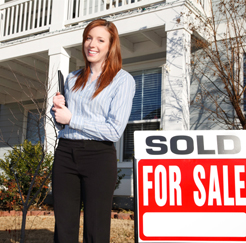
A green home sells faster and for more money than homes without energy-efficient designations according to Freddie Mac research. It was found that homes with high energy-efficiency ratings sold for 2.7% more on average compared to homes that did not.
You can invest in upgrades that will improve energy efficiency while adding value to your home. Here are a few examples of upgrades that will lower your energy bills and increase the value of your home.
Double-Pane Windows: When the heating and cooling system doesn’t have to work as hard to keep a consistent indoor temperature, there will be an obvious decrease in energy costs. Upgrade to double-pane windows, regardless of the type, and you will see some pretty significant energy savings. Energy Star-rated windows help maintain a consistent temperature inside your home year-round. And when it’s time to sell, window upgrades are a value-added selling point with buyers.
Spray Foam Insulation: Installing new spray foam insulation in a home that was already insulated or in a more contemporary house will see a 10 to 15 percent reduction in its cooling and heating costs. Adding more insulation to the attic is “one of the easiest things homeowners can do to improve the energy efficiency of their homes.
Use Energy Star Appliances: Another easy way that homeowners can improve their home’s energy efficiency is to replace all appliances with newer, more energy-efficient models. These will save you 10% to 50% of the energy required, and much more if you are replacing an old appliance.
Energy Star is a government-backed program for identifying products and appliances that meet certain energy efficiency standards. It was established in 1992 by the US Environmental Protection Agency as a way to promote products designed to use less energy and reduce recurring costs for consumers.
Upgrading your appliances is a way to increase value to your home and make it more appealing, as most buyers don’t want dated, unsanitary, malfunctioning appliances.
New Garage Door: A garage with poor energy efficiency can have a spillover effect on the rest of your home, particularly if the garage is attached to your home. Replacing your garage door will help your entire house stay cool in the summer and warm in the winter. Since a new door allows air conditioning and heating systems to work more effectively, it could reduce electricity waste and lower your energy bill.
The garage door is part of the curb appeal of your home – one of the first features buyers notice. An old, faded and damaged one can create a negative vision. Updating your garage door is one of the best home improvement return on investments.
The Bottom Line: A good realtor will know that a large part of selling your energy saving home will be to educate the buyer of all the benefits and values an energy efficient home brings. Your updated home will be a huge asset especially as the housing market evolves.

 See Our National Coverage Map
See Our National Coverage Map